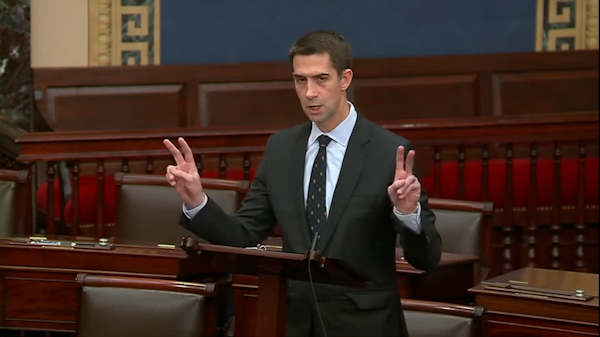SEJournal Online is the digital news magazine of the Society of Environmental Journalists. Learn more about SEJournal Online, including submission, subscription and advertising information.
 |
 |
| Sen. Tom Cotton, R-Ark., speaking against the PRESS Act on the floor of the Senate on Dec. 14, 2022. His opposition threatens to derail a federal shield law with wide support in Congress and in the journalism and free press community. Image: Sen. Tom Cotton via YouTube screenshot. |
WatchDog Opinion: Why the Press Needs To Press for Senate Action on the PRESS Act
By Joseph A. Davis
 |
Journalists shouldn’t have to go to jail to protect confidential sources. But they do.
That’s why it’s notable that the U.S. Senate this year has another chance to enact a federal “shield” law — a law that would in most cases keep reporters from being imprisoned for refusing to reveal their sources in the face of subpoenas.
But the bill may be stopped … by one determined senator: Arkansas Republican Tom Cotton, possibly joined by other MAGA Republicans.
Will this chance for the measure be the last?
For the answer, look to the Senate Judiciary Committee, where the bill lingers, and to the Senate itself. Look to the November election.
If Republicans retain control of either chamber of Congress or take the White House, it could be quite a while before there is another opportunity for this kind of legislation.
The journalism and
free press community’s
support for a shield law
is getting louder.
That’s why the journalism and free press community’s support for a shield law is getting louder. A coalition of at least 132 media groups, media lawyers and law professors are publicly urging Senate action.
In a May 30, 2024, letter, the coalition urged Sen. Dick Durbin, the Illinois Democrat who chairs the Senate Judiciary Committee, to schedule a markup of the PRESS Act (S. 2074) soon. Before it is too late.
The Society of Environmental Journalists, too, has signed on to the May 30 letter. And it has supported passage of a federal shield law multiple times in recent decades.
“For the press to be truly free, as the First Amendment guarantees, journalists need to be able to safeguard the confidentiality of sources whose information helps hold government to account,” said Tim Wheeler, chair of SEJ’s Freedom of Information Task Force.
“That's as true in reporting on climate and environmental issues as it is in any other matter of public interest,” added Wheeler. “The PRESS Act provides badly needed protection from compelled disclosure of journalists' sources and newsgathering materials.”
Cotton plugs up earlier measure
It’s not really a Republican-Democrat thing. In this hyperpartisan Congress deadlocked by division, there seems to be no organized GOP opposition. The House passed its counterpart to the PRESS Act (H.R. 4250) on Jan. 18, 2024.
There was not a single
Republican who called
for a recorded vote.
Not one. Man bites dog.
The weird thing is, the House passed it by an uncontested voice vote. In the whole cantankerous, deadlocked and dysfunctional House, there was not a single Republican who called for a recorded vote. Not one. Man bites dog.
That January House vote was not an accident. The House had passed a similar bill on Sept. 19, 2022 — also by voice vote.
But the Senate Judiciary Committee never acted on the House-passed bill.
In 2022, as the lame-duck Senate was struggling to finish its business on Dec. 14 with the clock running out, Sen. Ron Wyden, D-Ore., made a Hail Mary motion to pass the House-approved PRESS Act by unanimous consent. Wyden, a sponsor of the bill and a First Amendment champion, hoped that no senator would object.
But Sen. Cotton, a MAGA loyalist and a military veteran (two tours, in Iraq and Afghanistan), objected. He made a speech on the Senate floor saying why.
“The press, unfortunately, has a long and sordid history of publishing sensitive information from inside the government that damages our national security,” Cotton said. “During the Vietnam War, the New York Times published the Pentagon Papers in an effort to demoralize the American people and turn them against the war effort.”
Time now of the essence
Not all Republicans can be expected to oppose the PRESS Act. For instance, Sen. John Cornyn, R-Texas, who sits on the Senate Judiciary Committee with Cotton, is a very conservative GOPer who over the years has worked across the aisle to support press freedom.
That may not matter anyway. Dems on the Senate panel seem to have enough votes to report the bill out of committee. More problematic is what happens on the Senate floor, where just one senator — like Cotton — can slow the bill by objecting.
Slow it, but not necessarily stop it. Passing a bill in the Senate can take time when a senator thwarts unanimous consent by objecting. Even when a bill’s proponents have the 60 votes needed to overcome a filibuster, it can take two weeks to burn up the debate time and pass the bill.
The closer the Senate gets to
the next recess or the end
of the session, the more
precious time becomes.
The closer the Senate gets to the next recess or the end of the session, the more precious time becomes. That’s why it is important to get the PRESS Act to the Senate floor as soon as practical. If the Senate just passes the already House-passed bill, it would go straight to President Biden for signature.
But if the Senate balks, for whatever reason, it’s game over. And if the 2024 election gives either chamber of Congress or the White House to Republicans, hopes of a federal shield law may evaporate.
[Editor’s Note: For more background, see this WatchDog column on the proposed federal shield law from a year ago, and a column on how the Biden Justice Department sees reporter’s privilege, as well as an earlier WatchDog on leak subpoenas. Plus, get freedom of information resources and learn more about the SEJ's actions advocating access to environmental information — and supporting the media's right to know on behalf of the public.]
Joseph A. Davis is a freelance writer/editor in Washington, D.C. who has been writing about the environment since 1976. He writes SEJournal Online's TipSheet, Reporter's Toolbox and Issue Backgrounder, and curates SEJ's weekday news headlines service EJToday and @EJTodayNews. Davis also directs SEJ's Freedom of Information Project and writes the WatchDog opinion column.
* From the weekly news magazine SEJournal Online, Vol. 9, No. 24. Content from each new issue of SEJournal Online is available to the public via the SEJournal Online main page. Subscribe to the e-newsletter here. And see past issues of the SEJournal archived here.












 Advertisement
Advertisement 



